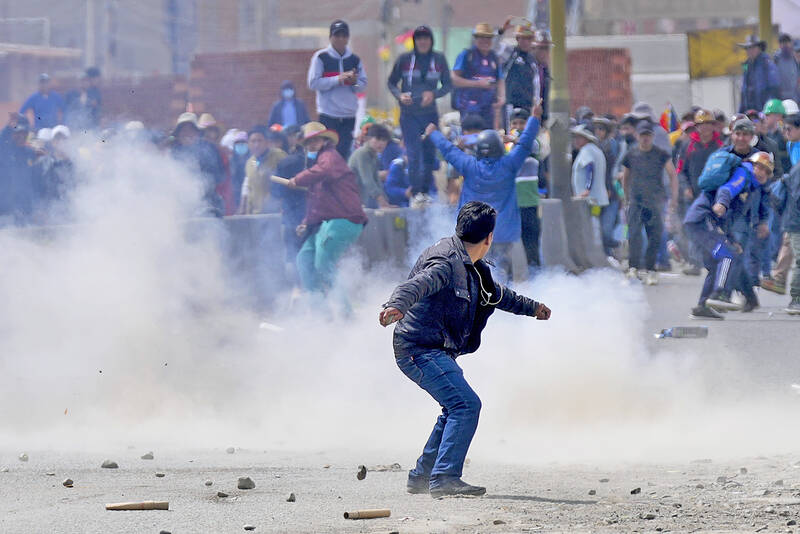Pro-government supporters and security forces on Sunday confronted protesters loyal to former Bolivian president Evo Morales in a street melee, the second such violent escalation in a week as fears grew of further unrest in the Andean nation.
The protesters and counterprotesters hurled firecrackers, homemade explosives and stones at each other across a dusty sprawl in the city of El Alto, while riot police unleashed tear gas into the crowds. At least eight people were injured, the Bolivian Ministry of Health said.
The standoff — which erupted while thousands of Bolivians supporting Morales continued a week-long 190km march to the capital, La Paz — spoke to the depth of the schism in Bolivian politics ahead of next year’s presidential election.

Photo: AP
Morales and his former economy minister-turned-bitter-rival, Bolivian President Luis Arce, are vying to lead Bolivia’s long-dominant socialist party, MAS, into next year’s vote. Their power struggle has paralyzed the government, exacerbated the depletion of Bolivia’s foreign exchange reserves and fueled street protests.
The rolling political crisis began in 2019, when Morales — who came to power in 2006 — was forced to resign after being re-elected to a third term in a vote marred by accusations of fraud and mass protests. He left the nation, but made a dramatic political comeback a year later, returning to find he had retained widespread support among poor and indigenous Bolivians.
Mobilized by Morales, bound together by misery over Bolivia’s economic meltdown and outraged by Arce’s efforts to block the candidacy of their polarizing former leader, the marchers on Sunday stopped on their sixth day of walking to sleep at an encampment 11km from El Alto, a sprawling city on a plateau above Bolivia’s capital.
Seeking to portray the march as a reflection of Bolivia’s indigenous highland culture as much as a political exercise, Morales — surrounded by supporters waving the multicolored flag dear to indigenous Andeans that the leftist leader turned into a patriotic symbol when he served as the nation’s first indigenous president — praised his supporters’ “peace and enthusiasm.”
Other Morales supporters broke off from the march and pressed into the scrappy outskirts of El Alto, where security forces and supporters of Arce had massed in anticipation of their arrival. The protesters and counterprotesters clashed in the neighborhood of Ventilla as acrid smoke from burning tires and thick clouds of tear gas coursed through the streets.
Each side blamed the other for the violence.
Morales accused Arce’s government of deploying “paramilitary groups to incite violence,” busing officers into El Alto to stir up trouble — a claim echoed by Bolivia’s ombudsman.
“It’s very sad that this government doesn’t pay attention to its conscience,” said Benita Cruz, a Morales supporter at the scene of the clashes. “They are repressing the poor and most humble people.”
In increasingly dramatic terms, Arce — who earlier this year faced what he described as a military coup attempt — has accused Morales of seeking to sabotage his government.
The unrest offered a possible preview for the coming days, as Morales and his thousands of supporters have promised to continue their so-called “March to Save Bolivia” into La Paz, despite vows by Arce’s supporters to prevent them.

MONEY GRAB: People were rushing to collect bills scattered on the ground after the plane transporting money crashed, which an official said hindered rescue efforts A cargo plane carrying money on Friday crashed near Bolivia’s capital, damaging about a dozen vehicles on highway, scattering bills on the ground and leaving at least 15 people dead and others injured, an official said. Bolivian Minister of Defense Marcelo Salinas said the Hercules C-130 plane was transporting newly printed Bolivian currency when it “landed and veered off the runway” at an airport in El Alto, a city adjacent to La Paz, before ending up in a nearby field. Firefighters managed to put out the flames that engulfed the aircraft. Fire chief Pavel Tovar said at least 15 people died, but

LIKE FATHER, LIKE DAUGHTER: By showing Ju-ae’s ability to handle a weapon, the photos ‘suggest she is indeed receiving training as a successor,’ an academic said North Korea on Saturday released a rare image of leader Kim Jong-un’s teenage daughter firing a rifle at a shooting range, adding to speculation that she is being groomed as his successor. Kim’s daughter, Ju-ae, has long been seen as the next in line to rule the secretive, nuclear-armed state, and took part in a string of recent high-profile outings, including last week’s military parade marking the closing stages of North Korea’s key party congress. Pyongyang’s official Korean Central News Agency (KCNA) released a photo of Ju-ae shooting a rifle at an outdoor shooting range, peering through a rifle scope

South Korea would soon no longer be one of the few countries where Google Maps does not work properly, after its security-conscious government reversed a two-decade stance to approve the export of high-precision map data to overseas servers. The approval was made “on the condition that strict security requirements are met,” the South Korean Ministry of Land, Infrastructure and Transport said. Those conditions include blurring military and other sensitive security-related facilities, as well as restricting longitude and latitude coordinates for South Korean territory on products such as Google Maps and Google Earth, it said. The decision is expected to hurt Naver and Kakao

Australian Prime Minister Anthony Albanese yesterday said he did not take his security for granted, after he was evacuated from his residence for several hours following a bomb threat sent to a Chinese dance group. Albanese was evacuated from his Canberra residence late on Tuesday following the threat, and returned a few hours later after nothing suspicious was found. The bomb scare was among several e-mails threatening Albanese sent to a representative of Shen Yun, a classical Chinese dance troupe banned in China that is due to perform in Australia this month, a spokesperson for the group said in a statement. The e-mail